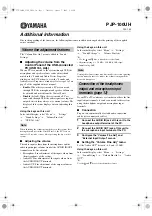
112
S
Sa
af
fe
et
ty
y
I
In
nf
fo
or
rm
ma
at
ti
io
on
n
113
• Do not use harsh chemicals, cleaning solvents or
strong detergents to clean the phone. Wipe it with a
soft cloth slightly dampened in mild, soapy water.
• If the phone or any of its accessories are not working
properly, take them to your nearest qualified service
centre. The personnel there will assist you, and if
necessary, arrange for the phone to be repaired.
Emergency Calls
Important!
This phone, like any cellular phone, uses
radio signals, cellular and landline networks,
as well as user-programmed functions that
cannot guarantee connection in all
conditions. Therefore, you should never rely
solely on any cellular phone for essential
communications (medical emergencies for
example).
Remember, to make or receive any calls, the phone must
be switched on and in a service area with adequate
cellular signal strength.
Emergency calls may not be possible on all cellular
phone networks or when certain network services
and/or phone features are in use. Check with local
cellular service providers.
Glossary of Terms
To help you understand the main technical terms and
abbreviations used in this booklet and take full
advantage of the features on your mobile phone, here
are a few definitions.
Active Flip
Ability to answer a call simply by opening the phone.
Call Barring
Ability to restrict outgoing and incoming calls.
Call Diverting
Ability to reroute calls to another number.
Call Holding
Ability to put one call on standby while answering or
making another call; you can then switch between the
two calls, as required.
Call Waiting
Ability to inform users that they have an incoming call
when engaged on another call.
DCS
Digital cellular network standard based on the GSM
network architecture. With the higher frequency range
(1800 MHz for DCS instead of 900 MHz for GSM), more
radio channels can be made available, thus allowing the
network to support more subscribers and traffic.






































